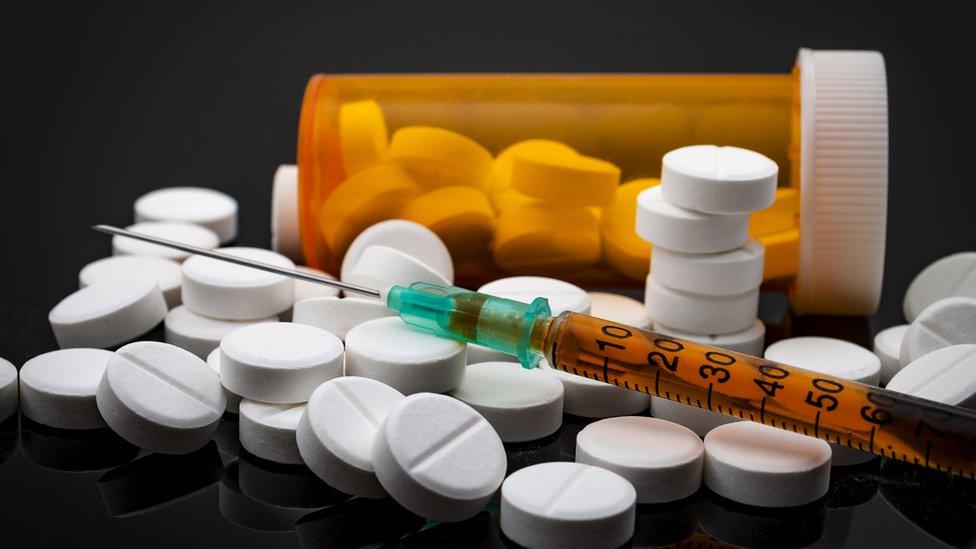Painkillers, addiction and me: One mother's story
- Published
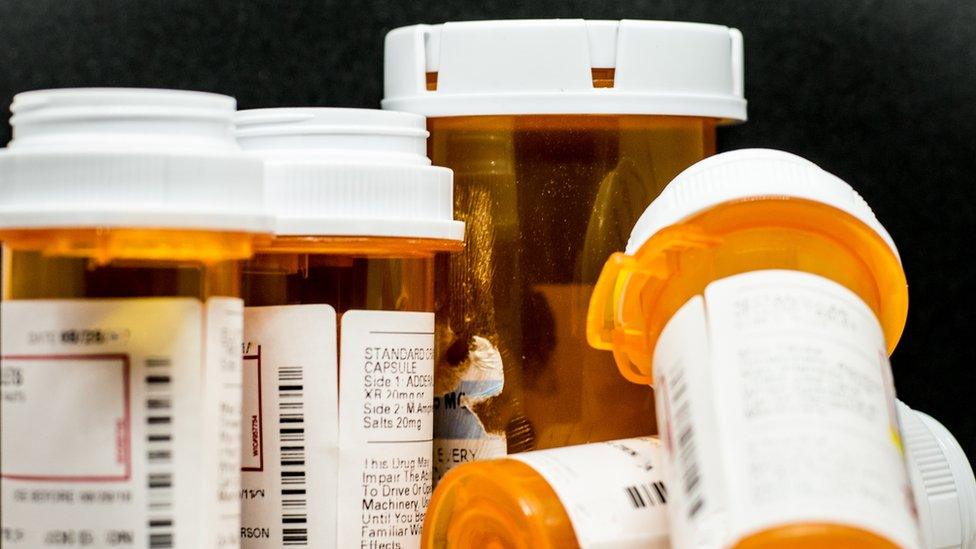
There are no figures on how many people might have an addiction to opioid painkillers in the UK
Almost 40 million powerful prescription painkillers were distributed to patients in England in 2022/23.
These opioid drugs include ingredients such as morphine, tramadol and fentanyl and all can be highly addictive.
The NHS has been trying to reduce their use - guidelines have been changed and the number of pills given out has been falling, but about 10% of England's population still use them.
There are no up-to-date figures for the number of people who are dependent on prescribed opioid painkillers but the BBC has met with one mother who wants to help other people with their addiction.
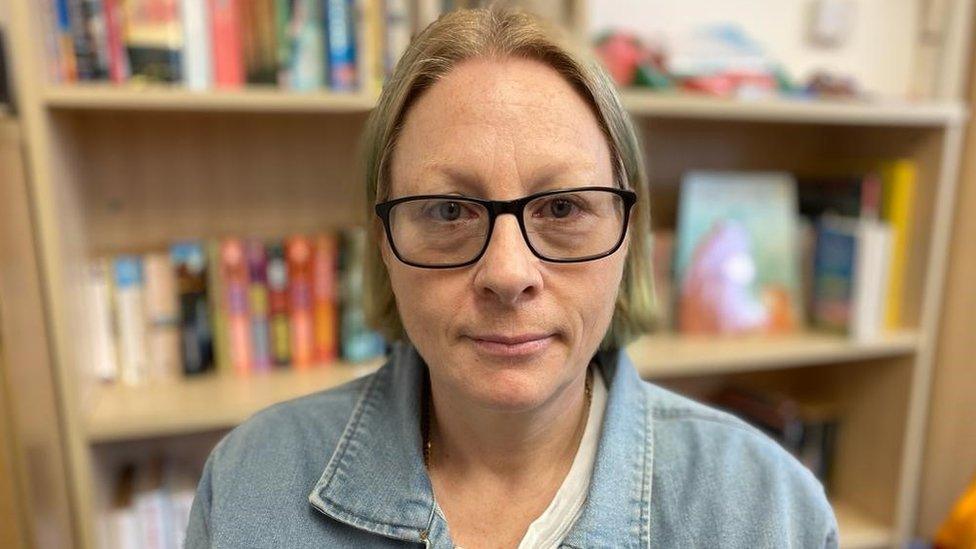
Helen Dews has been reliant on prescription opioids for 15 years
Helen Dews has lived with chronic pain for almost 20 years.
As well as a degenerative disc in her back, Helen also has two stomas and scar tissue.
She says initially she was prescribed codeine and tramadol to try and tackle the pains which wracked her body, before she was moved on to morphine and fentanyl.
"The only thing they think they can do with pain is give you more painkillers," she tells me.
She says the drugs have had a significant impact on her life and how she lives it.
"It changes so much, it fogs your brain up so you don't think properly and the memory loss.
"I couldn't remember anything."
Helen says she realised there was an issue when she found her painkilling fentanyl patch, which was supposed to be changed every three days, was not having the same impact and she realised she was changing it every day.
"I knew there was something was wrong, and in the back of my mind I thought it would be the addiction side, but I was too embarrassed, almost ashamed of myself," she said.
Her daughter Aimee Lord had also noticed, but did not want to say anything in case she upset her mother.
"When she said she wanted to see the doctors and speak to them about it, I said 'I will go with you'.
"I was slightly relieved because the topic had been broached. I didn't have to say it myself."
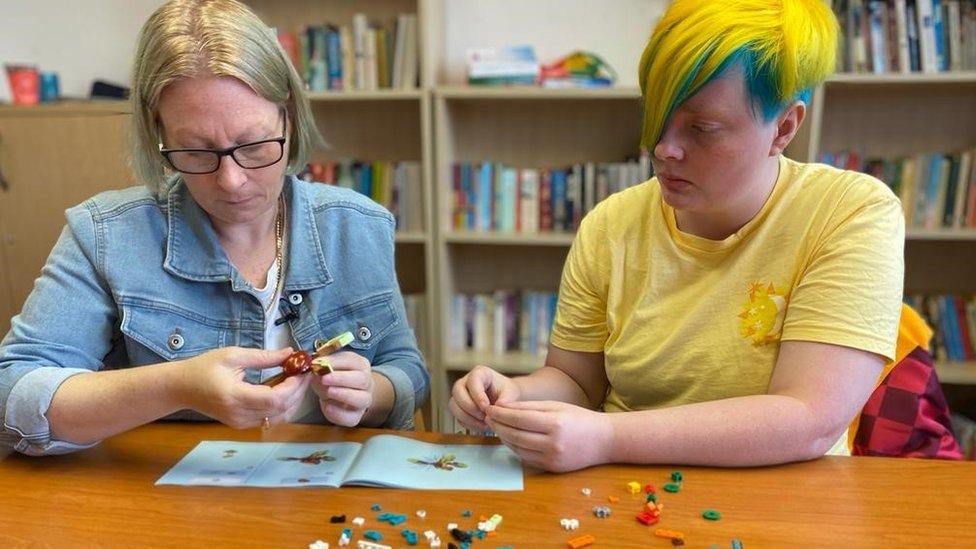
Helen Dews is supported by her daughter Aimee Lord as she works to overcome her addiction to painkillers
Helen was eventually referred to drug and alcohol service Forward Leeds in 2022.
"It changed everything, I understood what was going wrong, I understood what I was feeling was normal and what I was going through was normal."
She was also shocked to be told by staff at the service they were surprised she was still alive.
"Because I was on such a high dose and because of the other medication I am also on, she was surprised I hadn't overdosed."
For Aimee it was frightening.
"They gave me a naloxone kit, which is used to reverse an opioid overdose.
"We've gone all this time with this high dose and I could have come home from work and found her dead and I didn't know that."
Helen has now reduced her opioid use to the lowest possible level ahead of surgery she is due to have, but admits the withdrawal was difficult.
"You can't eat, you want to throw up, your whole body hurts, if affects your whole body and your mind, I've never known anything like it."
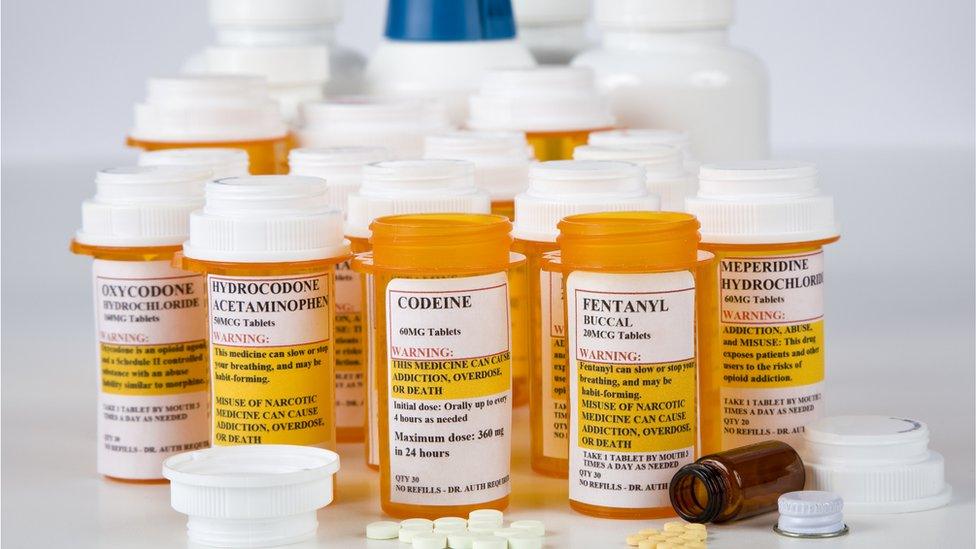
In the US opioid addiction has fueled a public health crisis
Painkiller addiction is already a big issue in the US.
Millions of people in America are now addicted to opiate-based pills and patches.
The country saw nearly 500,000 deaths from overdoses between 1999 and 2019, according to the US Centers for Disease Control and Prevention.
In England, Forward Leeds is establishing a specialist team to specifically tackle addiction to prescription painkillers.
Kelly Stockdale, from the support service, says it is a "massive problem" that, she believes, is not identified as an issue by many .
"Possibly people don't understand you can get physically addicted to opioids and it is justifiable because it is over-the-counter at the pharmacy or the GP."
Kelly explains that she would never have known about the issue before working at a drug treatment service.
"I knew what street drugs were, I knew what heroin was, I didn't realise it would be the same withdrawal as any other opioid."
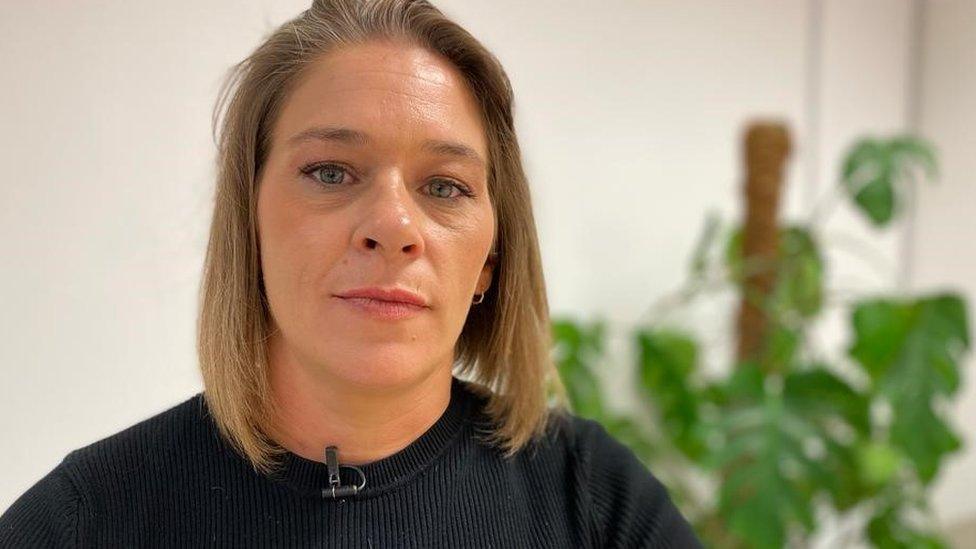
Kelly Stockdale from Forward Leeds said older people often do not realise they are dependent on painkillers
She says the organisation is seeing more people who are struggling with their painkillers, with six referrals for help in the last two weeks.
Younger people may have originally taken painkillers for "migraines or period pains", she says, but soon they can find themselves wanting higher doses to repeat the "euphoric feeling" they initially had to "manage their mood".
"In the older generation you would more see that it has been on repeat prescription for that long they didn't realise they were physically dependent."
"We have all walks of life coming through the doors," she adds to make sure we are clear that addiction can happen to anyone.
'Changed so much'
Helen is now much more positive about her future as she learns to manage her pain on lower doses.
"I am having to learn who I am now because I had been on it for so long I'd changed so much."
She had initially been reluctant to speak about her addiction publicly but says she hopes her story may help others seek help.
"I would rather have a bit of embarrassment than not help someone," she adds.
In March, the NHS in England said it had cut opioid prescriptions in England by 450,000 in under four years.
It also announced action to further reduce inappropriate prescribing of high-strength painkillers and other addiction-causing medicines and support for patients who had previously been prescribed them.
National medical director for NHS England Professor Sir Stephen Powis said at the time: "The plan gives clear guidance to support patients who no longer need these drugs to provide them with routine medicine reviews and move them on to other, alternative therapies."
If you have been affected by any of the issues raised in this report, you can find help and advice on the BBC Action Line.

Follow BBC Yorkshire on Facebook, external, Twitter, external and Instagram, external. Send your story ideas to yorkslincs.news@bbc.co.uk, external.
Related topics
- Published18 July 2023
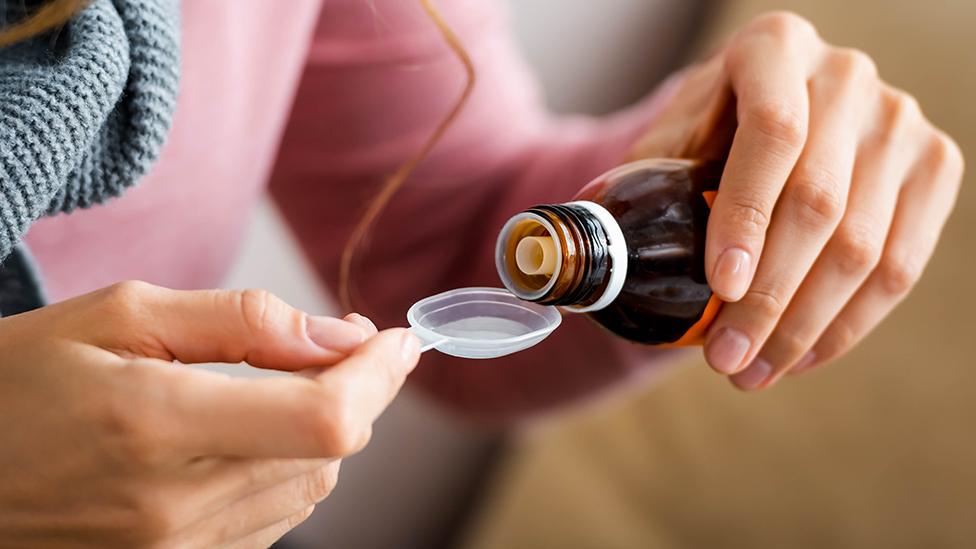
- Published28 April 2019

- Published31 May 2023
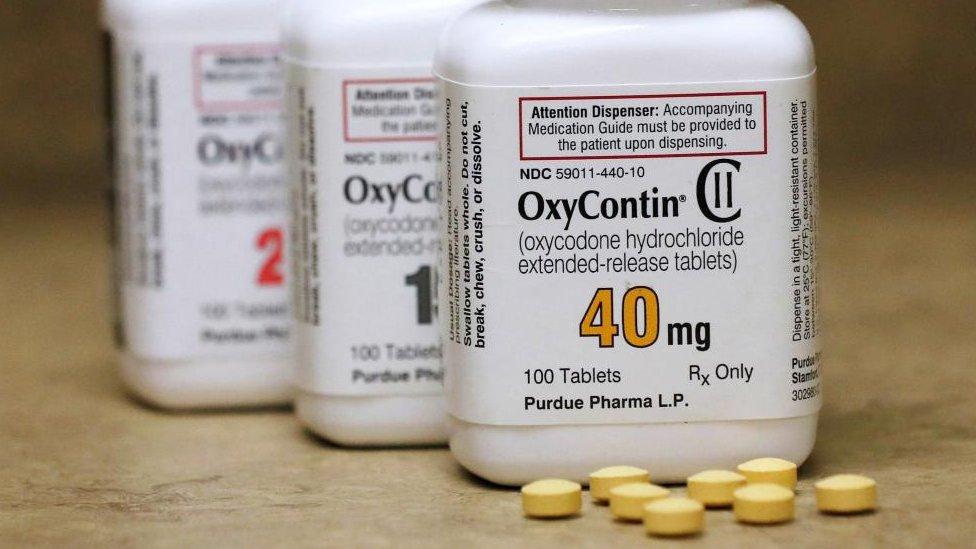
- Published17 November 2021
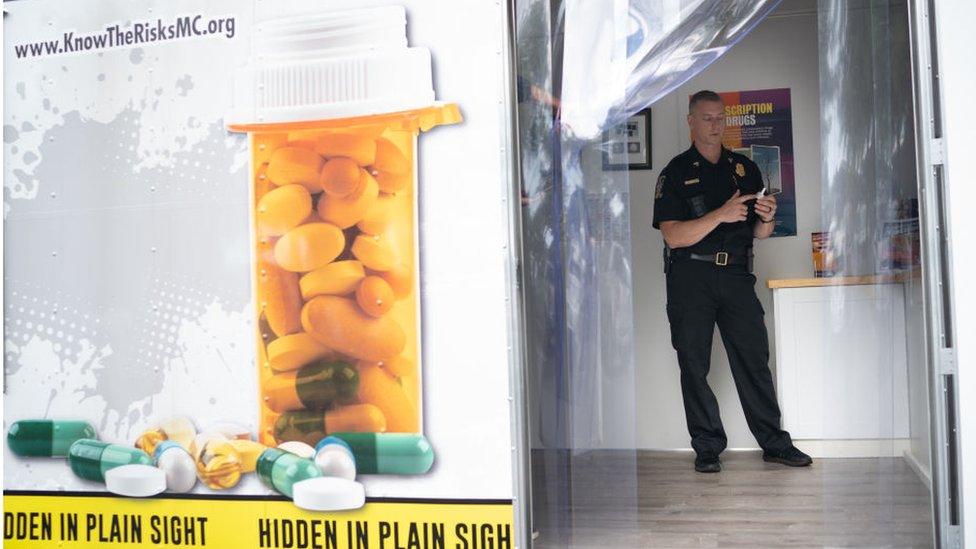
- Published19 March 2018
